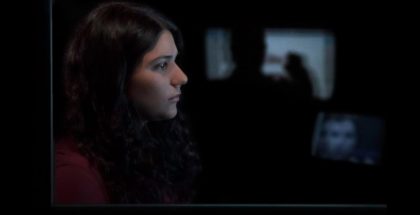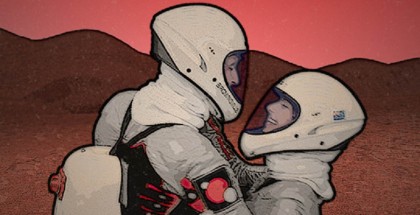UK TV review: Doctor Who Season 11, Episode 6 (Demons of the Punjab)
Review Overview
Marriage
8Monsters
6Music
10Mark Harrison | On 12, Nov 2018
This review contains no spoilers for Episode 6, but mentions plot details from the rest of Season 11 so far. Read on below for our additional spoilery observations, after you’ve seen the episode.
“I told you these days are cursed.”
Going back in time using a broken watch feels like a very Doctor Who way to start a story. While Episode 6, Demons of the Punjab, is a cracking 50 minutes of television, it feels as if it might have been a stone-cold classic, if it had loosened up on the rest of its science fiction trappings.
The watch in question is given to Yaz by her grandmother, Umbreen (Leena Dhingra), who claims to be the first woman ever to be married in Pakistan. Curious to find out what Nani isn’t telling her, Yaz asks the Doctor to take her back to the day the watch was originally broken, which lands the gang in India in August 1947 – the day before the British Partition takes effect.
The time travellers know that the next few days hold a terrible upheaval for the people of India, but more immediately troubling is the fact that young Umbreen (Amita Suman) is about to marry a young Hindu man called Prem (Shane Zaza), who is very nice and everything, but isn’t actually Yaz’s grandfather. Even more worryingly, there are tales of demons roaming the land.
While stories about companions getting personally invested in fixed history have been told throughout the entire run of Doctor Who, from 1964’s The Aztecs to Father’s Day and The Fires Of Pompeii, it’s surprising that it’s taken 55 years to do a grandfather paradox episode. Or in this case, a grandmother paradox. That the episode also gives the vastly underserved Mandip Gill something to do is just a bonus.
The Aztecs was part of a sub-genre retrospectively called the “pure historical”, in which the Doctor and the TARDIS are the only sci-fi elements in a story that happens to be set in the past. Despite flirting with the concept a few times, the new series has never had an episode like this, and if ever there was a time to commit to bringing it back properly, it feels as if Demons Of The Punjab was it.
Just as recent episodes Arachnids In The UK and The Tsuranga Conundrum have hit all the right Who notes without necessarily hitting them in the right order, this is a great episode that further suggests that this new era isn’t particularly attuned to the basics. While the titular demons are proper alien creatures, with a brilliant design, it strangely feels as if the episode might be better off without them.
While relevant in the context of reviewing a Doctor Who episode, this does feel like a minor quibble. There’s a lot to love here, not least of which is the love on display. Despite the strictly human antagonism that’s brewing here, the tale of Prem and Umbreen is an essentially romantic one. Airing on Remembrance Sunday, it’s an episode that prizes love in troubled times. Although it’s a world apart from the Back To The Future riff that the premise initially suggests, Vinay Patel’s script is very good at setting up its characters and the educational aspect absolutely makes up for the shameful absence of this aspect of 20th-century history from most school curriculums.
But it’s composer Segun Akinola who deserves the most praise this time. As gorgeous as the location photography is – Andalusia, convincingly standing in for India – his stirring score really complements the story, from his excellent incidental music to the haunting one-off arrangement of the Doctor Who theme in the closing credits.
Not quite as successful as this season’s Rosa, Demons Of The Punjab is a very bold outing that could only be improved by being bolder. After 13 years of new episodes, the pure historical has yet to make an official comeback, and if there’s any downside to this story, it’s that the things that make it Doctor Who mostly feel like a distraction. Nevertheless, the tale is strong enough that it feels churlish to begrudge the way it’s told.
Doctor Who Season 11, Episode 6 is available on BBC iPlayer until 9th June 2019.
Additional notes (contains spoilers)
– “I know what you are. I know what you do. And it’s not happening here.” That’s a bit of the Sheffield steel we’ve been waiting for in Jodie Whittaker’s performance since the first episode finished, but the stories haven’t given her many opportunities to do it. Granted, it’s undercut the moment we find out that the Thijarians have reformed, but it’s exciting when she gets a little more fiery.
– On the other hand, Graham is very precious to us. Bradley Walsh continues to enjoy the most rounded character work of the regulars and, after only six weeks in, he finally has a conversation with Yaz. His portrayal of a thoroughly decent bloke is endlessly watchable – if Walsh’s commitments to ITV take him away for next season, then we riot.
– Comparisons to Rosa are inevitable, as both episodes end with the Doctor having to do nothing and let human history unfold. Here, it’s played as more of a down note, which makes the Doctor’s passivity in the second half feel more like doing nothing. The dilemma of choosing between saving the day and keeping Yaz in existence is keenly felt and brilliantly played, but it robs the Doctor of some of her predecessors’ agency in a way that we hope the remaining episodes will avoid.
– The Thijarians’ new MO of travelling through time and space and witnessing the deaths of those who die unacknowledged is hugely reminiscent of Testimony, the alien agency in Peter Capaldi’s swansong, Twice Upon A Time. They’re “aliens with compassion”, as Graham puts it, serving as a way to outline the more terrestrial evil. That said, Manish (Hamza Jeetooa) becomes the umpteenth antagonist in a row to just wander off, escape, or otherwise get away with it. Bah.
– Further showing off the new production value, the snazzy new transmat effect looks very much like apparating in the Harry Potter films. The show’s first transmat appeared all the way back in 1969’s The Seeds Of Death, as a way of transporting humans from Earth to the Moon, and has been used as a catch-all teleportation term by Doctor Who’s writers ever since.
– “Oil, water, tree bark, a saucepan, nine containers, an old newspaper, a touch of ox spit, a chicken poo, and a biscuit.” One of these things is not like the others, and the Doctor’s face as she asks for it was a real highlight. Whittaker knows, man…





















